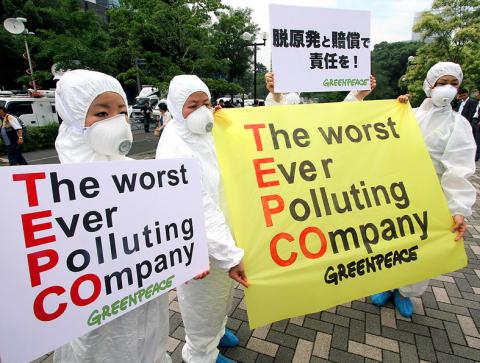In 2008 prizewinning environmentalist author Mark Lynas experienced a “eureka moment.” Reading the hostile comments underneath an article on the Internet outlining his objections to genetically modified foods, he decided his critics were probably right.
A couple of years later, Lynas had another eureka moment when he read Stewart Brand’s book, Whole Earth Discipline, in which the American writer tore up the green rulebook and came out in favor of urbanization, nuclear power and genetic engineering. A few months ago, Lynas appeared in a TV documentary, What the Green Movement Got Wrong, alongside Brand — and inside the ruins of Chernobyl which, he argued, had not been nearly as devastating a disaster as most people think.
Next week Lynas publishes a new book, The God Species: How the Planet Can Survive the Age of Humans, in which he takes his argument with the green movement a step further. The book accuses the greens of having helped cause climate change through their opposition to nuclear power, and calls this a “gargantuan error, and one that will echo down the ages.”

Photo: Bloomberg
“Anyone who still marches against nuclear today,” he writes, “as many thousands of people did in Germany following the Fukushima accident, is in my view just as bad for the climate as textbook eco-villains like the big oil companies.”
The idea for Lynas’ new book came to him in another “moment of revelation” two years ago. Lynas, who is a part-time climate adviser to the Maldives government (he is also a visiting researcher at Oxford University), was invited to sit in on the meetings of a group of scientists in Sweden. The group was aiming to flesh out the concept of “planetary boundaries,” coined by sustainability expert Johan Rockstrom.
The best-known of these so-called boundaries is the climate-change one — the amount of carbon dioxide in the atmosphere. But there are boundaries too for biodiversity, nitrogen, and ocean acidification. The idea is that, beyond these limits, Earth’s systems will begin to break down.

Photo: Bloomberg
Lynas’ revelation was that these new rules about how to live on Earth should immediately replace many older green ideas, and over drinks he and Rockstrom agreed that Lynas would write a book with the aim of popularizing them. But the most attention-grabbing passages in the book come in Lynas’ denunciations of the green movement, and when we talk he makes no attempt to play them down. Instead he draws my attention to his blog, where over the past fortnight he has enthusiastically joined in attacks on a recent Intergovernmental Panel on Climate Change report on renewable energy. And he argues that “the green movement in itself is dying — I’m an environmentalist but not a green.”
Lynas, who describes himself as a “recovering activist,” was involved
in direct action in his student days. He was heavily involved in the
anti-genetically modified foods movement of the 1990s, ripping up sweetcorn and sugarbeet crops from fields in East Anglia, and on occasion being chased by police and police dogs.
But is he a maverick iconoclast, stirring up controversy for the media by turning on his old allies? Or are the views expressed in his book symptomatic of broader divisions?
Eighteen months after the failure of the Copenhagen climate summit, there are signs of wider frustration. With no sign of progress in setting global emissions limits, a steady stream of reports gives cause for alarm to those who are already worried. Last week it was the turn of the oceans, with a warning about pollution and overfishing, last month a sudden upsurge in Amazon deforestation. Earlier this week climate skeptic Michele Bachmann launched her bid to become the next US president, while the EU was forced to put off a vote toughening emissions targets following reports that British Conservative Members of the European Parliament were planning to reject it.
“People think that getting some publicity, having some tea with a minister and civil servants, lobbying parliamentarians, is making a difference, but it’s not,” says Charles Secrett, the former Friends of the Earth director who two weeks ago wrote an article accusing the organization of being bureaucratic and out of touch. “Protest ain’t going to win the day. Nor is a sort of incremental engagement with government and industry. The movement as a whole has got to collaborate more, pool resources — money, staff, ideas — and generate real cross-party pressure.”
Novelist Ian McEwan spent years researching renewable energy for his 2010 novel Solar, and says when he began “there was a positive mood for action, a public awakening. Now I think everyone has fallen back to sleep. Copenhagen was something of a fiasco … And the ideological deniers are well organized. At this point I don’t see change coming from a bottom-up process, from a kind of peasants’ revolt. I think the consumer moment has passed and people have got bored.”
This feeling of a missed opportunity, and of 2009 as a high-water mark in public engagement with the issues, finds many echoes. Though activists trumpet their recent successes in having seen off the third runway at Heathrow in London and a new fleet of coal-fired power stations, as well as helping persuade British Prime Minister David Cameron to commit the UK to a strict timetable for cutting emissions, they admit that disappointment after Copenhagen, and uncertainty about the future, have been difficult to manage.
Tamsin Omond of direct action group Climate Rush remembers 2009 as a heady time: “[This] was the year we said we would do one action a month, and we did. Everyone saw this as the one chance and the feeling of momentum — that we only had to work really hard until December, and then we could have a rest — was really present. Everything we did would get in the papers and journalists were phoning up all the time. I was completely caught up in it.”
Post-Copenhagen, consensus is harder to find. The recent ructions boil down to three issues. The first is nuclear power, with environmental activist George Monbiot, former Greenpeace director Stephen Tindale and McEwan among those to agree with Lynas that atomic energy is vital if we are to wean the world off fossil fuels.
Another disagreement is summed up by Charles Secrett’s complaints about Friends of the Earth. Some activists believe that the big, long-established NGOs need to get better at mobilizing their supporters and achieving a greater degree of focus and coordination, as well as building up links with nimbler and more dynamic direct-action campaigns.
But the biggest issue of all is the nature of environmental politics. Is the green movement a left-wing, anti-capitalist movement? Lynas believes it is, and that those who style themselves as greens should be marginalized and allowed to die off so that they can be replaced by a new breed of market-friendly environmentalists like him. “If it becomes a culture war like the debate over abortion or something, you can’t win,” he says. “I want an environmental movement that is happy with capitalism, which goes out there and says yes rather than no, and is rigorous about the way it treats science.”
Those within the green mainstream reject this analysis outright. Writer and environmentalist Jonathon Porritt argues that social justice is intrinsic to the sustainability agenda, while Greenpeace director John Sauven points out that the charity has worked closely with all the main political parties in Britain and with multinational corporations abroad. “It’s a very broad camp, isn’t it? On the one hand you’ve got the anti-capitalists, and then you’ve got quite a strong body within the Conservative party that takes the environmental agenda very seriously.”
He believes Lynas over-eggs the nuclear point, and that the power of the economic and political interests aligned against change — above all the US fossil fuel lobby — must be understood. Others point out that there is already a strong emphasis on green growth and development.
“If we haven’t been good enough at appealing to people across the board then we are missing a trick,” says Omond. “We are all on the same planet, we have a ballooning population, diminishing resources and a changing climate, and we really need to grow up and see the situation for what it is … We need to be talking to everyone.”

June 2 to June 8 Taiwan’s woodcutters believe that if they see even one speck of red in their cooked rice, no matter how small, an accident is going to happen. Peng Chin-tian (彭錦田) swears that this has proven to be true at every stop during his decades-long career in the logging industry. Along with mining, timber harvesting was once considered the most dangerous profession in Taiwan. Not only were mishaps common during all stages of processing, it was difficult to transport the injured to get medical treatment. Many died during the arduous journey. Peng recounts some of his accidents in

“Why does Taiwan identity decline?”a group of researchers lead by University of Nevada political scientist Austin Wang (王宏恩) asked in a recent paper. After all, it is not difficult to explain the rise in Taiwanese identity after the early 1990s. But no model predicted its decline during the 2016-2018 period, they say. After testing various alternative explanations, Wang et al argue that the fall-off in Taiwanese identity during that period is related to voter hedging based on the performance of the Democratic Progressive Party (DPP). Since the DPP is perceived as the guardian of Taiwan identity, when it performs well,

The Taiwan People’s Party (TPP) on May 18 held a rally in Taichung to mark the anniversary of President William Lai’s (賴清德) inauguration on May 20. The title of the rally could be loosely translated to “May 18 recall fraudulent goods” (518退貨ㄌㄨㄚˋ!). Unlike in English, where the terms are the same, “recall” (退貨) in this context refers to product recalls due to damaged, defective or fraudulent merchandise, not the political recalls (罷免) currently dominating the headlines. I attended the rally to determine if the impression was correct that the TPP under party Chairman Huang Kuo-Chang (黃國昌) had little of a

At Computex 2025, Nvidia CEO Jensen Huang (黃仁勳) urged the government to subsidize AI. “All schools in Taiwan must integrate AI into their curricula,” he declared. A few months earlier, he said, “If I were a student today, I’d immediately start using tools like ChatGPT, Gemini Pro and Grok to learn, write and accelerate my thinking.” Huang sees the AI-bullet train leaving the station. And as one of its drivers, he’s worried about youth not getting on board — bad for their careers, and bad for his workforce. As a semiconductor supply-chain powerhouse and AI hub wannabe, Taiwan is seeing